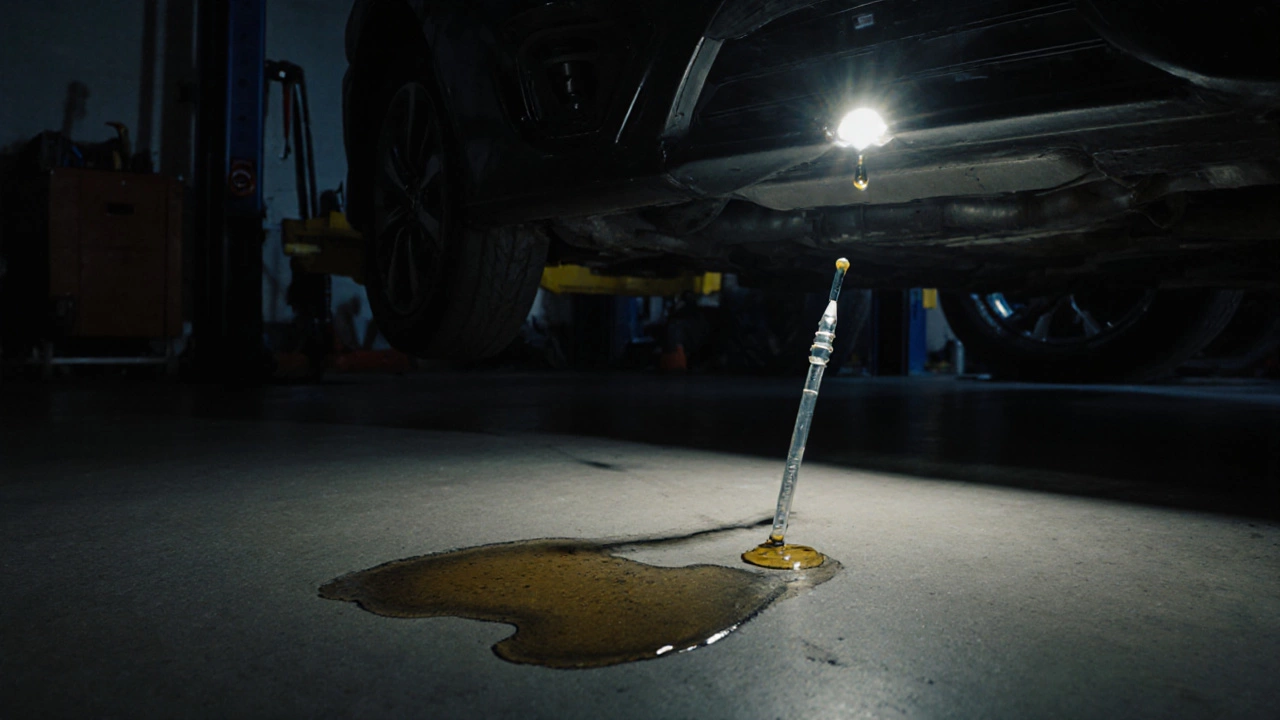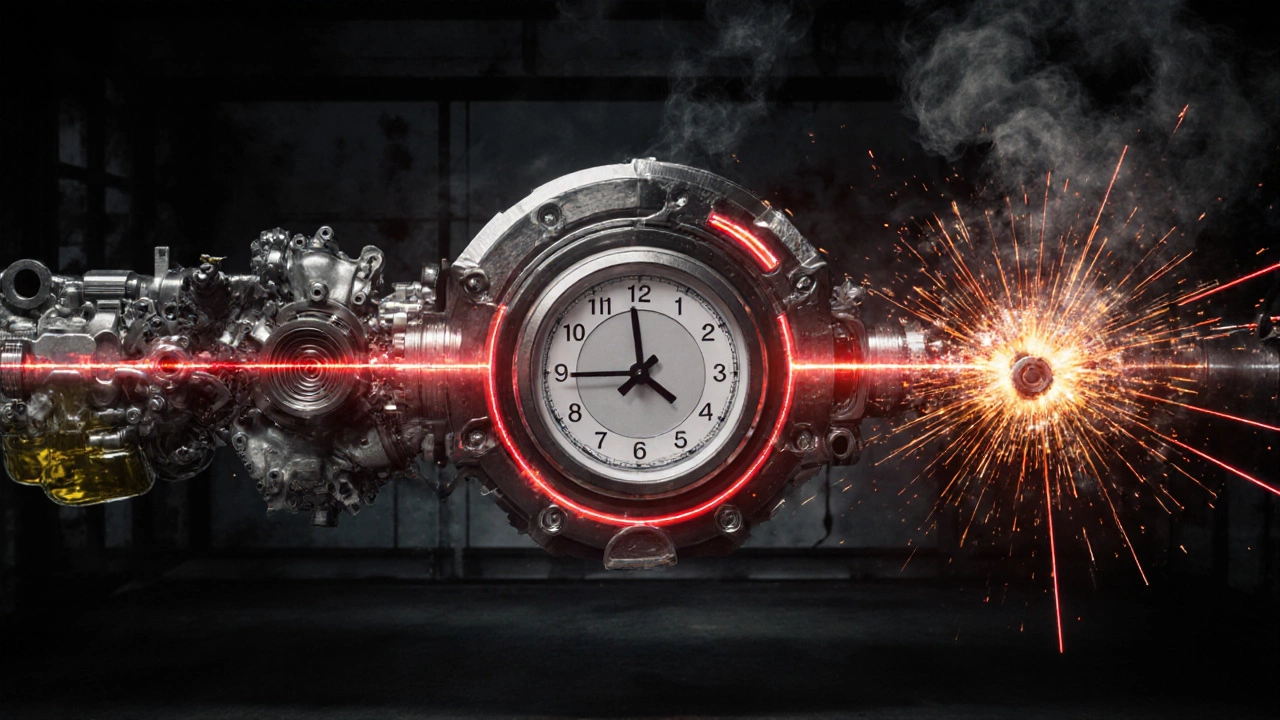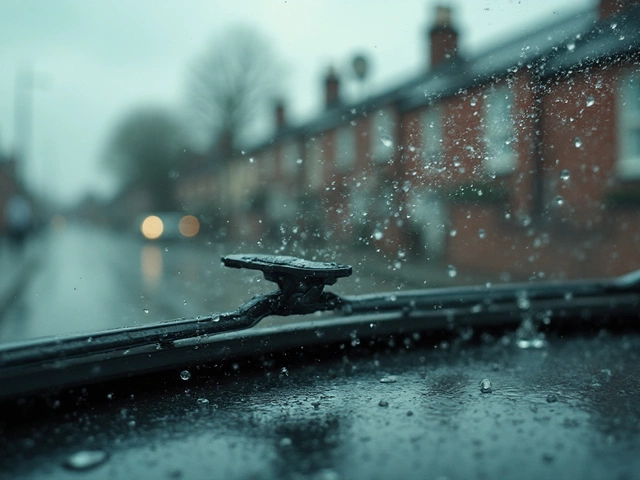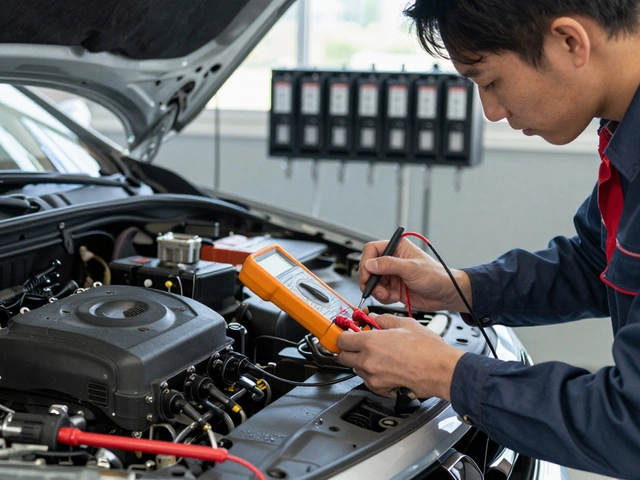Oil Starvation Calculator
How Long Can Your Engine Run Without Oil?
Based on real-world engine teardowns and dyno tests, estimate when your engine might fail due to oil starvation.
Ask someone how long a car can run without oil, and you’ll get answers ranging from "a few minutes" to "it’ll just stop." The truth? It’s worse than you think - and it happens faster than most drivers realize.
What Happens When Oil Disappears
Engine oil isn’t just a lubricant. It’s the lifeblood of your engine. Without it, metal parts that slide against each other - pistons, crankshafts, camshafts, valves - start grinding. These parts are precision-machined to fit within microns of tolerance. They’re not meant to touch. Oil creates a thin film between them, preventing direct contact. When that film vanishes, friction turns into heat, and heat turns into destruction.
Within 30 seconds of oil starvation, the engine’s temperature spikes. Bearings begin to overheat. The crankshaft’s main bearings, which normally float on a cushion of oil, start to seize. The connecting rods, which connect pistons to the crankshaft, begin to warp. You won’t hear it at first. No warning light, no sputtering. Just silence - then a knock.
The Timeline: Seconds to Catastrophe
There’s no magic number. But here’s what actually happens, based on real-world engine teardowns and dyno tests:
- 0-30 seconds: Oil pressure drops. The engine keeps running, but internal friction is already climbing. Bearings start to overheat.
- 30-120 seconds: The first signs of damage appear. The camshaft lobes begin to wear. Lifters collapse. Valves may not close properly.
- 2-5 minutes: Metal-to-metal contact becomes widespread. The crankshaft bearings start to spin in their housings. The engine begins to knock loudly - a sound you won’t forget.
- 5-10 minutes: Catastrophic failure. A connecting rod can punch through the engine block. The pistons melt. The crankshaft snaps. The engine is dead.
Some engines have held out longer - up to 15 minutes - but only under light load. Idling in neutral, with no acceleration, gives you a few extra seconds. But if you’re driving at highway speed, the engine dies in under three minutes. That’s less time than it takes to make a coffee.
Why Some Engines Die Faster Than Others
Not all engines are built the same. Older engines with thicker oil films and looser tolerances might last a little longer. Modern high-revving engines - especially turbocharged ones - are far more vulnerable.
Take a turbocharger. It spins at over 100,000 RPM. Its bearings rely on a constant flow of oil to cool and lubricate. Without oil, a turbo can fail in under 10 seconds. And when it does, metal shards fly into the engine, causing even more damage.
High-performance engines, like those in BMWs, Audis, or late-model Mustangs, run tighter clearances. They’re designed for power, not forgiveness. A drop in oil pressure here isn’t a warning - it’s a death sentence.
Even so-called "low-maintenance" engines - like the ones in Toyotas or Hondas - aren’t immune. They’re reliable because they’re built to last with proper care. Take away the oil, and they’re just as doomed as any other engine.

What the Warning Lights Don’t Tell You
Most cars have an oil pressure warning light. But it doesn’t turn on until the damage is already done. By the time that red light flashes, your bearings are worn, your valves are bent, and your crankshaft is overheating.
Modern cars also have oil life monitors. But those don’t measure actual oil pressure. They track mileage and driving conditions, then guess when to change the oil. If you’re leaking oil or burning it, the monitor won’t catch it. You could be running on fumes and never know.
That’s why checking your oil manually matters. It takes 30 seconds. Pop the hood, pull the dipstick, wipe it clean, stick it back in, pull it out again. If the level is below the minimum mark - don’t drive. Add oil immediately. If you’re out of oil, don’t even try to start the car.
Real-Life Examples
In Bristol, a mechanic I know had a customer come in with a 2018 Honda Civic that wouldn’t start. The owner said he’d noticed a slight noise but didn’t think much of it. He’d driven 40 miles after the oil change, then ignored the warning light. When he stopped at a gas station, the engine seized. The repair bill? £3,200 - more than the car was worth.
Another case: a delivery van in Bath. The driver thought the oil leak was "just a drip." He topped it off every week. But the leak got worse. One morning, the engine seized on the M4. The company lost a van, a driver’s time, and a delivery contract. All because someone assumed a little oil loss was "normal."
These aren’t rare stories. They happen every week.

How to Avoid This
You can’t control everything. But you can control these five things:
- Check your oil every week. Even if your car says it’s fine. A dipstick is your best friend.
- Don’t ignore leaks. A small puddle under your car isn’t just a mess - it’s a countdown.
- Change oil on schedule. Don’t stretch it. Even if the monitor says you’ve got 50% life left.
- Use the right oil. Your manual says 5W-30? Don’t use 10W-40 because it’s cheaper. Viscosity matters.
- Listen to your engine. A new knocking, ticking, or whining noise? Don’t wait. Get it checked.
Oil changes cost £40-£80. Engine replacement costs £2,000-£8,000. The math isn’t close.
What Happens After the Engine Dies
If your engine seizes from lack of oil, you’re not just dealing with a broken engine. You’re dealing with a total loss.
Most mechanics won’t even try to rebuild it. The damage is too widespread. Bearings, pistons, valves, crankshaft, camshafts - they’re all compromised. Rebuilding requires disassembling the entire engine, measuring every part, replacing everything. It’s expensive. And even then, it’s a gamble.
Most people end up replacing the engine. Or the whole car.
And if you’re not insured for mechanical failure? You’re out of pocket. No warranty covers oil starvation. It’s considered negligence.
The Bottom Line
A car can run without oil for less than five minutes. That’s it. No exceptions. No "maybe."
There’s no "grace period." No "it’ll be fine." The engine doesn’t care if you’re in a hurry, if you’re broke, or if you "just forgot." It runs on physics, not excuses.
Check your oil. Every week. Even if you think you’re fine. It’s the single most important thing you can do to keep your car alive.
Don’t wait for the light to turn on. By then, it’s too late.






